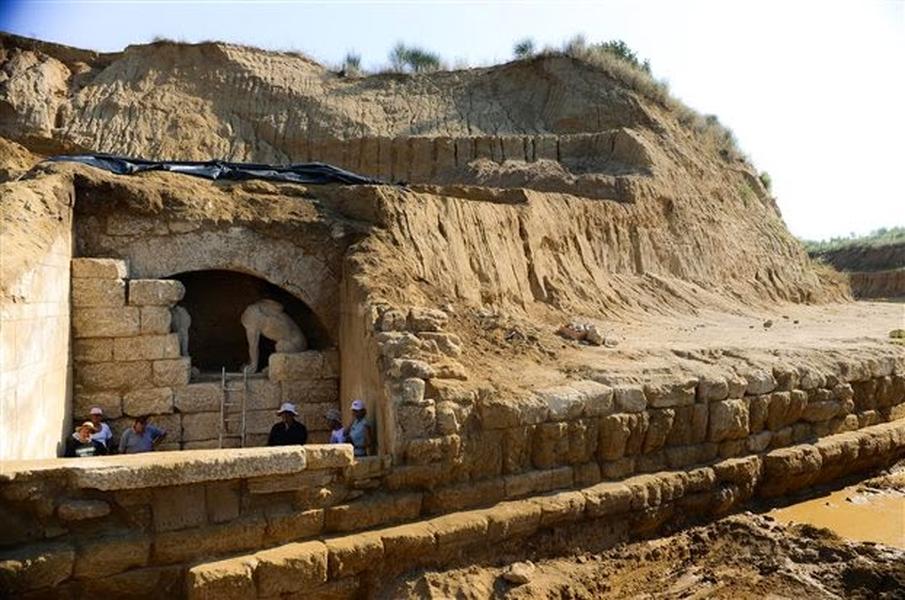Archaeologists discover 'secret vault' in Alexander the Great-era tomb


A free daily email with the biggest news stories of the day – and the best features from TheWeek.com
You are now subscribed
Your newsletter sign-up was successful
The ancient burial site in Amphipolis has yielded a number of intriguing finds, and now a secret vault has been added to the mix.
The Amphipolis tomb, in Greece's Serres region, dates to 325-300 B.C.E. and was likely built after Alexander the Great's death. The tomb, which is the largest ever discovered in Greece, has yielded two marble Caryatids, a.k.a. female sculptures, as well as masonry walls and an arch with two sphinxes. The tomb also revealed a mosaic depicting the abduction of Persephone, complete with the Greek god Hermes.
The tomb's inhabitant, though, has remained a mystery. Some experts believe that the tomb was home to Olympias, Alexander the Great's mother, because the rosettes on a marble block in the tomb "strongly resemble" those found on the coffin of Philip II, Alexander the Great's father. A lion statue was also found at the site, which corroborates writings from the Greek Plutarch about Olympias' tomb. Other suggestions about the tomb's inhabitant include Roxane, Alexander's wife, or that the tomb was never occupied and was intended for Alexander himself.
The Week
Escape your echo chamber. Get the facts behind the news, plus analysis from multiple perspectives.

Sign up for The Week's Free Newsletters
From our morning news briefing to a weekly Good News Newsletter, get the best of The Week delivered directly to your inbox.
From our morning news briefing to a weekly Good News Newsletter, get the best of The Week delivered directly to your inbox.
Early last week, the archaeologists announced that the tomb included three funeral chambers, and the remains had been looted from the site. Now, though, the experts have found evidence of a fourth chamber — a secret, "underground vault." Greece's Ministry of Culture confirmed Friday that the third chamber, which was also home to the Persephone mosaic, included an entrance to the secret room, which is 13 by seven feet.
The new vault gives the archaeologists hope that they can still determine the tomb's inhabitant, and whether or not it was, in fact, Olympias. The archaeologists have cleared the surface of the third chamber and are now examining the fourth chamber's contents.
A free daily email with the biggest news stories of the day – and the best features from TheWeek.com
Meghan DeMaria is a staff writer at TheWeek.com. She has previously worked for USA Today and Marie Claire.
-
 The ‘ravenous’ demand for Cornish minerals
The ‘ravenous’ demand for Cornish mineralsUnder the Radar Growing need for critical minerals to power tech has intensified ‘appetite’ for lithium, which could be a ‘huge boon’ for local economy
-
 Why are election experts taking Trump’s midterm threats seriously?
Why are election experts taking Trump’s midterm threats seriously?IN THE SPOTLIGHT As the president muses about polling place deployments and a centralized electoral system aimed at one-party control, lawmakers are taking this administration at its word
-
 ‘Restaurateurs have become millionaires’
‘Restaurateurs have become millionaires’Instant Opinion Opinion, comment and editorials of the day
-
 Nobody seems surprised Wagner's Prigozhin died under suspicious circumstances
Nobody seems surprised Wagner's Prigozhin died under suspicious circumstancesSpeed Read
-
 Western mountain climbers allegedly left Pakistani porter to die on K2
Western mountain climbers allegedly left Pakistani porter to die on K2Speed Read
-
 'Circular saw blades' divide controversial Rio Grande buoys installed by Texas governor
'Circular saw blades' divide controversial Rio Grande buoys installed by Texas governorSpeed Read
-
 Los Angeles city workers stage 1-day walkout over labor conditions
Los Angeles city workers stage 1-day walkout over labor conditionsSpeed Read
-
 Mega Millions jackpot climbs to an estimated $1.55 billion
Mega Millions jackpot climbs to an estimated $1.55 billionSpeed Read
-
 Bangladesh dealing with worst dengue fever outbreak on record
Bangladesh dealing with worst dengue fever outbreak on recordSpeed Read
-
 Glacial outburst flooding in Juneau destroys homes
Glacial outburst flooding in Juneau destroys homesSpeed Read
-
 Scotland seeking 'monster hunters' to search for fabled Loch Ness creature
Scotland seeking 'monster hunters' to search for fabled Loch Ness creatureSpeed Read
